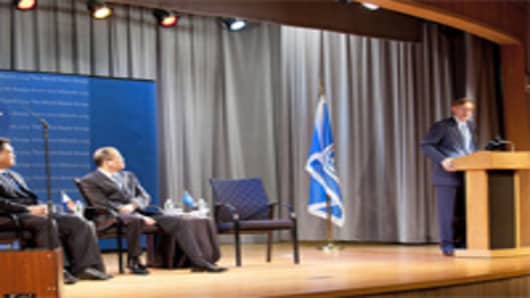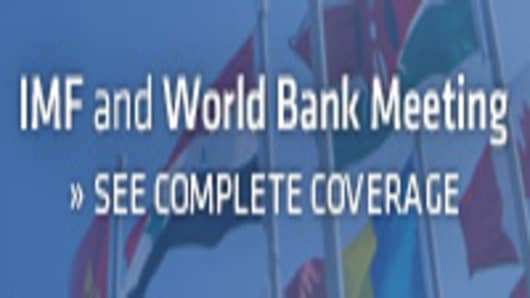WASHINGTON—Wall Street is often criticized for trying to turn bad news into good news. That's not the situation at this weekend's IMF meeting, where even good news has an ominous cloud over it.
Case in point: Economist Indermit Gill was explaining to attendees in Washington Friday that all of the two dozen or so countries in Europe and Central Asia are expecting positive growth for 2012.
But there was a catch.
"Countries' economists are an optimistic bunch," cautioned Gill, the World Bank's chief economist for Europe and Central Asia, or ECA in IMF terms. "For that reason you should be skeptical about these numbers."
The observation was symptomatic of the mood at the World Bank/International Monetary Fund conference, which also includes talks between members of major developed countries known as the Group of 20, a sister group of the IMF. Not long ago, the conference looked like it would be an upbeat gathering about a prosperous year ahead, but now it has turned into a fairly somber affair.
As headwinds gather in Europe and the U.S. stock market appears to be aggressively pricing in a looming recession, the IMF finds itself at the center of the financial universe.
Even an expected ECA growth rate of 3.8 percent for the year ahead is drawing sighs amid worries that troubled debt-laden nations such as Greece and Italyare ready to implode. In that case, all bets are off.
"Even the slow recovery is clouded more. It's a more uncertain recovery," Gill said. "Looking at 2012, it's a very clouded picture."
Philippe Le Houerou, regional vice president of the World Bank, used the term "new normal" — which officials at bond fund Pimco coined during the financial crisis — to describe the region's slow-growth prospects.
"Clearly the year coming is one of big uncertainty," he said. "Slower growth in the euro zone and Eastern Europe will hurt the ECA region as a whole."
Like many others here, Le Houerou and Gill worry most about the impact southern Europe's debt problems will have on the region as a whole, despite its growth prospects.
Earlier in the day, IMF Managing Director Christine Lagarde expressed the same concerns that global economies are expected to grow in 2012 — a good thing — but that growth is threatened by an almost certain intensifying of the problems in peripheral Europe — a bad thing.
"As we gather inside this hall, the mood outside is grim," she said. "All across the world, people worry more and more about their futures, and their children's futures. They are looking to us for solutions."
Lagarde noted that global growth is likely to be 4 percent overall, but just 1.5 to 2 percent in developed economies such as Europe and the U.S. It's an almost irreconcilable notion, that the prime engines of growth can be a near standstilland yet the world can continue forward.
She spoke of "dark clouds over Europe and huge uncertainty in the United States" that "risk a collapse in global demand."
"There is a recovery, but it is weak and uneven. And risks have increased sharply," she said. "They are propelled by a negative feedback loop — between weak growth, weak balance sheets among sovereigns, banks and households, and inefficient political commitment. That has led to a crisis of confidence."
Finally, she delivered a stern warning to both the U.S. and Europe that unless they lead in fiscal and monetary policy, there will be little chance for the slow-growth story to change.
Interestingly, she also noted the willingness of central banks to "dive back into unconventional waters as needed" though she did not mention specifically the U.S. Federal Reserve move this week to drive down borrowing coststhrough the so-called Operation Twist.
"The United States must reduce its fiscal deficit over the medium and long term, deal urgently with unemployment and relieve pressure on overly indebted households," Lagarde said. "Europe must deal urgently with the twin problems of sovereign debtand bank debt, and deal with them together."
Outside the World Bank's halls, the expectations for the IMF to light a way forward were subdued. The G-20 held its news conference Friday evening, but delivered little regarding policy direction ahead.
David Rosenberg, senior economist and strategist at Gluskin Sheff in Toronto, had warned that "there is certainly nothing concrete coming out of the G-20 meeting to instill confidence either, unless platitudes get you excited."
Indeed, the two officials representing the G-20 seemed not to want to address the sovereign debt situation all all, instead discussing the integrity of the world's food supply and a financial transaction tax.
"We have a method, a strategy, a calendar. Nothing else to add," Francois Baroin, minister for the economy, finance and industry, said during a session scheduled for one hour but cut short after barely 40 minutes.
Lagarde, for her part, said policy makers still can act, despite the reduced prospects for growth ahead.
"We have entered what I call a dangerous new phase. And yet there is a way forward," she said. "The policy options have narrowed, but that does not mean there are no options."




